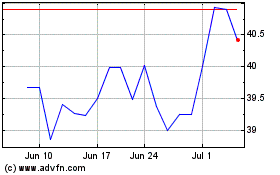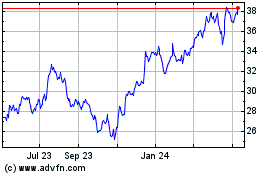Merrill Lynch Boosts Profit, Fee-Based Assets
July 18 2017 - 2:15PM
Dow Jones News
By Lisa Beilfuss
Merrill Lynch continued to pull client money into fee-based
accounts during the second quarter, helping to push the brokerage's
net income to the best level since it was acquired by Bank of
America Corp. in 2009.
Clients of Bank of America's global wealth unit, which includes
Merrill Lynch, moved $27.5 billion into fee-based accounts during
the period. While that was down 5.8% from the first quarter in part
because of a divestiture, it was a more-than fourfold increase from
a year earlier. Net income rose to $804 million from $705 million a
year earlier.
Higher client assets on the fee side means a bigger benefit for
the firm from rising markets and higher interest rates, said Devin
Ryan, a managing director at JMP Securities LLC. "Higher markets
are flowing through fee-based lines," Mr. Ryan said, as clients pay
a percentage of their account value for advisory services.
Brokerages have for years been putting more emphasis on boosting
their revenue from recurring fees charged to customers. Fee revenue
tends to be more predictable and steady compared with commissions,
which can be harder hit during periods of market volatility. The
shift has accelerated since the Labor Department's fiduciary rule
requiring brokers to act in the best interests of retirement savers
was unveiled last year; the rule aims to eliminate conflicts from
advice that often come when commissions are charged.
Merrill Lynch has been more aggressive than its competitors in
moving customers into fee-based accounts, Mr. Ryan said. To avoid
the rule's more onerous requirements and heightened legal risk,
Merrill has said clients who wanted retirement advice from one of
its brokers would have to pay a fee. The firm said more than
two-thirds of its advisers now have at least half of their client
assets under a fee-based relationship.
On a conference call Tuesday, Bank of America Chief Executive
Brian Moynihan said the possibility of a revised or rescinded
fiduciary rule isn't likely to change the firm's strategy. "Let's
see what happens," he said, but "I don't expect to change our
course." The Labor Department is in the midst of reviewing the
Obama-era regulation after President Donald Trump ordered the
agency to do so after his inauguration. The rule went into partial
effect June 9.
Rivals such as Morgan Stanley and Wells Fargo & Co. have
said they would continue to allow retirement savers to pay
commissions in retirement accounts, though they would likely face
some sales restrictions. Still, those banks have continued to
report gains in fee-based assets in recent years.
Meanwhile, online brokerage platform Merrill Edge reported 21%
jump in assets from the year-earlier period to $159 billion, the
bank said, thanks to market performance and a 10% increase in
self-directed accounts. It is unclear how much of that money is net
new money, analysts say. The bank launched Merrill Edge in 2010 to
attract investors with less than $250,000 in assets, and a
robo-adviser service was recently added to the platform.
The firm added to its adviser ranks during the period. Merrill
said it had 14,811 advisers at the end of June, up 1.6% from a year
earlier.
Write to Lisa Beilfuss at lisa.beilfuss@wsj.com
(END) Dow Jones Newswires
July 18, 2017 14:00 ET (18:00 GMT)
Copyright (c) 2017 Dow Jones & Company, Inc.
Bank of America (NYSE:BAC)
Historical Stock Chart
From Mar 2024 to Apr 2024

Bank of America (NYSE:BAC)
Historical Stock Chart
From Apr 2023 to Apr 2024
